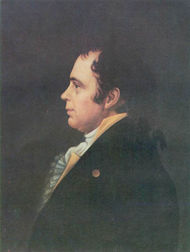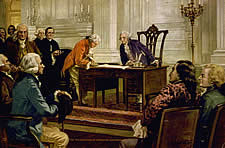James Mchenry
 From Conservapedia
From Conservapedia | Founding Fathers | |
|---|---|

| |
| James McHenry | |
| State | Maryland |
| Religion | Presbyterian[1] |
| Founding Documents | United States Constitution |
James McHenry (November 16, 1753 - May 3, 1816) was a statesman, physician, Secretary of War under George Washington and John Adams, and a delegate to the Constitutional Convention where he later signed the United States Constitution. He was a devout Christian. In a letter written in 1813, he had this to say about the Bible:
Bibles are strong entrenchments. Where they abound, men can not pursue wicked courses.[2]
Fort McHenry in Baltimore is named after him.
Contents
Early life[edit]
James McHenry was born to Daniel and Agnes McHenry at Ballymena, County Antrim, Ireland on November 16, 1753. When about eighteen years of age he took a voyage to America for his health and was so charmed with the country that he persuaded his father to come over and engage in business in Baltimore. After passing some time at Newark Academy, a noted Delaware preparatory institution, he moved to Philadelphia and engaged in the study of medicine as an apprentice under Benjamin Rush.[3]
Family[edit]
In 1784, he married Margaret "Peggy" Caldwell, and they had four children.[4]
Career[edit]
He was fully imbued with the patriotic principles of his preceptor, and when the Revolutionary War broke out, at his own expense journeyed to Cambridge and volunteered his services at the American Hospital. He was not long however without official position, for on August 10, 1776, he was commissioned Surgeon of the Fifth Pennsylvania Battalion commanded by Colonel Robert Magaw and one of the finest organizations in the army. It was barely two weeks later on August 26, that Congress evidently sensible of the desirability of utilizing McHenry's services to the best advantage, adopted the following resolution which Dr. Rush considered did the young medical officer as much honor as if they had made him director of a hospital:
Resolved, that Congress have a proper sense of the merit and services of Doctor McHenry, and recommend it to the directors of the different hospitals belonging to the United States, to appoint Doctor McHenry to the first vacancy that shall happen of surgeon's berth in any of the said hospitals.
McHenry was not yet destined, however, to be employed as a hospital surgeon, for his battalion was for the next three months engaged in operations active enough to satisfy his utmost ambitions and on November 16, 1776 he was taken prisoner with his command when Fort Washington was over taken by Sir William Howe.[5] After a couple of months' confinement he was paroled and compelled to remain idle until early in May 1778, when he was finally exchanged and went on duty as Senior Surgeon of the Flying Hospital.
It was but a few days, however, before he was ordered to headquarters and assigned to duty as Secretary to the Commander-in-Chief, an event which marked the permanent termination of his medical practice. As Washington's Secretary he was an adviser through several battles: the Battle of Monmouth, the Battle of Springfield, and the Battle of White Plains.[6] In 1780, he was relieved from duty with the Commander-in-Chief and assigned nominally as aide-decamp but really as guide, philosopher and friend to the youthful and enthusiastic Marquis de Lafayette, who had been commissioned as a Major General in the American establishment. In May 1781, Dr. McHenry was commissioned as Major to date from the preceding October.
In September, 1781, when still with la Fayette before the Battle of Yorktown, McHenry was elected to the Maryland State Senate, an office which he held for the ensuing six years. Meanwhile, he was also elected to Congress of which he was a member from 1783 to 1786. He was a member of the Constitutional Convention of 1786, with other Maryland delegates Daniel of St. Thomas Jenifer, Daniel Carroll, John Francis Mercer and Luther Martin; one of a group of three physicians (The other two were James McClurg and Hugh Williamson) at the convention. In 1788 and 1789 he was a member of the General Assembly, and from 1791 to 1795 he again represented his district in the State Senate.
McHenry, a student of Benjamin Rush, favored abolition of slavery and believed in the equality of the races. He publicly supported Benjamin Banneker,[7] publisher of a well known almanack in 1791, and wrote of him as a stereotypical self-made man.[8]
Secretary of War[edit]
His appointment by Washington in January, 1796, as Secretary of War, however, took him out of state politics and carried him once more into the national arena. The work of the War Department remained in his hands thenceforth through the administration of Washington and on into that of John Adams. When war with France seemed unavoidable in 1798, he had the supervision of the preparations for the conflict; and here his medical knowledge rendered him of peculiar value to the country, enabling him to speak with authority when he wrote to Congress, that "the Secretary does not discover in any of the Acts the necessary provision for the appointment of hospital officers or a hospital establishment. As military hospitals are indispensable to an army especially in time of war, it is respectfully suggested that provisions on the subject ought to be made by law, and that the regulations to be found in the resolutions of the old Congress, more particularly in those under date of September 30, 1780 and January 3, 1782, as certainly the faithful results of much experience, may afford some important lights respecting this Department. The certain consequences of disregarding so essential a measure in the event of war and the encampment of an army will be a train of diseases which must cut off a large proportion of our troops." The result of this judicious reminder was the act of March 2, 1799 providing for the best medical organization the Army had ever possessed up to that time.
The later years of Secretary McHenry's administration were marred by misunderstandings and disagreements with President John Adams, largely because of McHenry's attachment to his old friend and comrade in arms, Alexander Hamilton, and on May 13, 1800 the strained relations culminated after a stormy discussion with his chief, in the resignation of his portfolio.
Later life[edit]
From this time he withdrew from public life and lived quietly upon his estates adjacent to the city of Baltimore, where his services to his state and to his country were worthily commemorated by the neighboring works of Fort McHenry, which have permanently preserved his name in the military annals of the nation, and in which, oddly enough the services of another military medical officer have recently been commemorated by the bestowal of his name upon one of its batteries, -Battery Lazear. Living then in elegant retirement but by no means in idleness, Dr. McHenry survived, a respected and honored citizen of the commonwealth, until his death, May 3, 1816. He was laid to west at the Westminster Hall and Burying Ground in Baltimore.
Quotes[edit]
- "I consider this Negro as fresh proof that the powers of the mind are disconnected with the colour of the skin or in other words, a striking contradiction to Mr. Hume's doctrine that "the Negroes are naturally inferior to the whites and unsusceptible of attainments in arts and sciences.""[9][10]
Bibliography[edit]
- Robbins, Karen E. James McHenry, Forgotten Federalist, (2013)
See also[edit]
References[edit]
- ↑ Our Christian Founding Fathers
- ↑ Original Intent (2004), David Barton, Pg. 164
- ↑ The Surgeon generals of the Army of the United States of America
- ↑ The Men Who Made the Constitution: Lives of the Delegates to the Constitutional Convention
- ↑ The Life and Correspondence of James McHenry: Secretary of War Under Washington and Adams
- ↑ Soldier-statesmen of the Constitution
- ↑ The American Museum, Or Universal Magazine: Containing Essays on Agriculture, Commerce, Manufactures, Politics, Morals and Manners
- ↑ Contesting Slavery: The Politics of Bondage and Freedom in the New American Nation
- ↑ The American Teacher: Foundations of Education
- ↑ Ebony Mar. 1964
| |||||||||||||||||||||||||||||||||||||||||||||||||||
Categories: [United States History] [Founding Fathers]
↧ Download as ZWI file | Last modified: 02/09/2023 15:28:41 | 18 views
☰ Source: https://www.conservapedia.com/James_McHenry | License: CC BY-SA 3.0
 ZWI signed:
ZWI signed:
 KSF
KSF